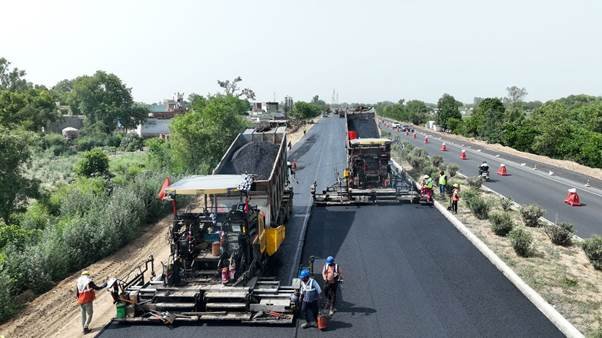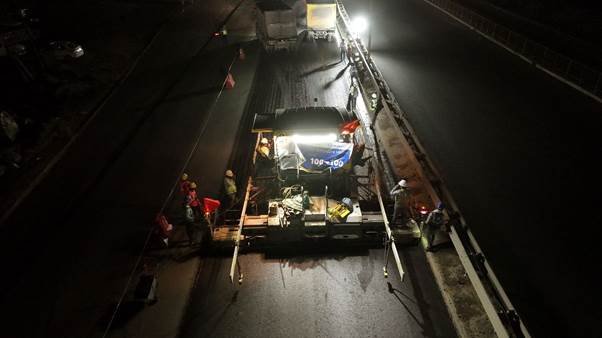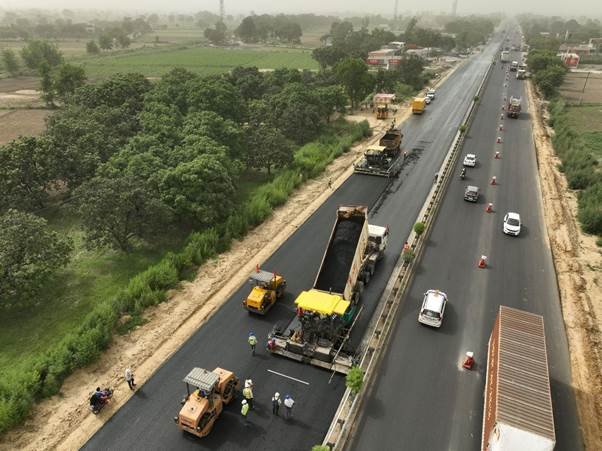Bituminous Concrete is a versatile and durable material that is used in a variety of applications. It is a strong and reliable choice for a variety of projects, from road construction to roofing to paving.
Bituminous concrete, also known as asphalt concrete, is a composite material made of aggregate (such as sand or gravel) and bitumen (a sticky, black substance that is a form of asphalt). It is a versatile material that is used in a variety of applications, including road construction, roofing, and paving. Bituminous concrete is a type of pavement material that consists of mineral aggregate bound together with bitumen, which is a byproduct of petroleum refining.
Bitumen acts as a binding agent that gives the concrete a tar-like consistency when heated and hardens into a dense solid surface when cooled. Bituminous concrete is also known as asphalt concrete or simply asphalt in some regions.
Bituminous concrete, also known as asphalt concrete or blacktop, is a type of construction material used for paving roads, parking lots, and other surfaces.
Bituminous concrete is made by heating bitumen until it becomes a liquid and then mixing it with aggregate. The aggregate provides strength and durability, while the bitumen acts as a binder that holds the aggregate together. The mixture is then poured into a mold or placed on a surface and allowed to cool and harden.
Use of Bituminous Concrete
Bituminous concrete is used for surfacing roads, parking lots, airports, and other public spaces. It is usually laid in layers and compacted by paving machines. It has some advantages over standard concrete, such as lower cost, easier repair, smoother and quieter ride, and better resistance to cracking and rutting. However, it also has some disadvantages, such as environmental impact, lower strength, higher maintenance, and susceptibility to weathering and oxidation.
Application of Bituminous Concrete
Bituminous concrete is a strong and durable material that is resistant to water and weathering. It is also relatively inexpensive to produce and maintain. These factors have made it a popular choice for a variety of applications, including:
Road construction
Bituminous concrete is the most common material used in road construction. It is used to make the surface of roads, as well as to provide a base for roads.
Roofing
Bituminous concrete is used to make roofing materials, such as shingles and tiles. It is also used to seal roofs and prevent leaks.
Paving
Bituminous concrete is used to make sidewalks, driveways, and other paved surfaces. It is also used to make playground surfaces and other areas where a durable and slip-resistant surface is needed.

Ghaziabad-Aligarh Expressway Sets Record: 100 Km of Bituminous Concrete Laid in 100 Hours
In an extraordinary milestone for India’s road infrastructure industry, the Ghaziabad-Aligarh Expressway has made history by accomplishing an unprecedented feat. Over a distance of 100 lane kilometers, the expressway successfully laid Bituminous Concrete in a remarkable time of just 100 hours. This achievement serves as a testament to the dedication and ingenuity of the teams involved in this exceptional project.

Union Minister for Road Transport and Highways, Nitin Gadkari, expressed his heartfelt congratulations to the outstanding teams responsible for this feat. The collaborative efforts of Cube Highways, L&T, and Ghaziabad Aligarh Expressway Pvt Ltd (GAEPL) were instrumental in making this accomplishment a reality.
The Minister said this innovative green technology involves utilizing 90% of the milled material, which amounts to nearly 20 lakh square meters of road surface. He said consequently, the consumption of virgin materials has been reduced to a mere 10%. By adopting this approach, we have significantly reduced fuel consumption and the associated greenhouse gas emissions, thereby making a substantial contribution to lowering our carbon footprint, he said on May 18, 2023.

Union Minister for Road Transport and Highways, Nitin Gadkari, expressed his heartfelt congratulations to the outstanding teams responsible for this feat. The collaborative efforts of Cube Highways, L&T, and Ghaziabad Aligarh Expressway Pvt Ltd (GAEPL) were instrumental in making this accomplishment a reality.
Addressing the Celebration Ceremony virtually Shri Gadkari said the Ghaziabad-Aligarh section of NH34, spanning 118 kilometers, plays a vital role as a transportation link between the densely populated regions of Ghaziabad and Aligarh. He said this project traverses various towns and cities in Uttar Pradesh, including Dadri, Gautam Buddh Nagar, Sikandrabad, Bulandshahr, and Khurja. It serves as a critical trade route, facilitating the movement of goods and contributing to regional economic development by connecting industrial areas, agricultural regions, and educational institutions, he added.







